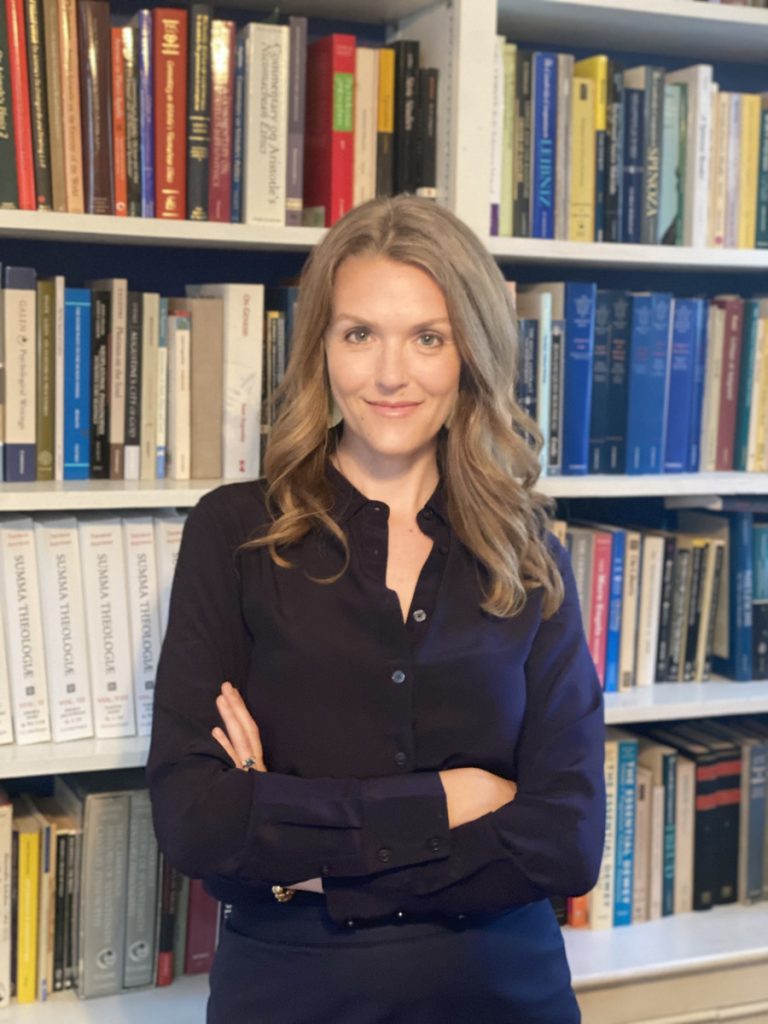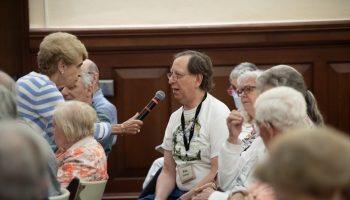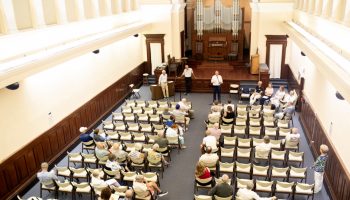
Mariia Novoselia
Staff writer
Classical literature, philosopher Jennifer Frey said, helps people find the meaning of life by exploring “big existential questions,” such as: Are we free? Does God exist? What is love? What is justice? What’s my purpose? Why do I suffer? Expanding on this week’s theme “The Life of Literature,” Frey will discuss the role and power of classical texts in hopes to give Chautauquans “an impetus and desire” to read them. Her lecture, in which she said she’ll try to debunk misconceptions about the value of classical literature, is at 10:45 a.m. today in the Amphitheater.
The purpose of higher education is one of many questions that Frey ponders: “Is it an education for work? I would like to say that it isn’t.” Instead, she said she sees higher education as “education for flourishing, for living well, for being free.”
Being free, Frey said – free to think, to respond, to pursue “the true, the good and the beautiful” – constitutes a “flourishing human life.” These “ends” are beyond work, which Frey said, is undoubtedly important. Higher education, she said, “was always aimed at those higher ends.”
Right now, Frey said, society is in the middle of the so-called “crisis of the humanities and higher education.”
“Humanities majors, which were very traditional forms of study in the university, like English and literature, philosophy and classics, are starving for students,” Frey said. “Students don’t want to enroll in these classes, and the result is, in many cases, that departments are shut down.”
Frey said she found interest in moral questions as a young person. While she felt strongly about her moral beliefs, she said she could not justify them, which bothered her. This prompted her to pose questions, which eventually led her to believe that to live in a praiseworthy way, one has to “cultivate virtues.”
Virtues, she said, are “stable dispositions of thinking, feeling, acting and desiring.”
Currently, Frey said she is keen on virtue pedagogy. Some of the questions she is trying to find answers to include if and how one can teach virtues and whether or not there is a connection between the study of classical texts and the cultivation of virtue.
“I think there can be,” she said.
Frey earned her bachelor’s degree in philosophy and medieval studies at Indiana University, then a doctorate degree in philosophy at the University of Pittsburgh.
At that time, in the late 1990s, when she was an undergraduate student, Frey said she never worked with a female philosophy professor. While the numbers have gotten better over the years, she said, they are still “nowhere near even.”
During the course of her career, Frey said what’s prevented her from burning out is the love she has for the discipline.
“I find that intellectual life is incredibly exciting. It’s really hard and it can be exhausting, but it’s also really exciting,” she said. “It’s really gratifying to share that with other people in the classroom, in conversation, in conference with other scholars.”
In July, Frey became the inaugural dean of the Honors College at the University of Tulsa. The curriculum she is building, Frey said, will be centered around the study of classical texts.
Those texts that “have stood the test of time,” she said, can shape the ways people think and see the world, as well as their purpose, or meaning, in it.
“I think the reason that these texts endure is because (they) raise the fundamental human questions that lie at the center of human life,” Frey said.
The meaning of life, she said, can and does change over time, and from one person to another.
“A meaningful life is one that is intentionally ordered to some kind of good that transcends the self and fulfills human nature in a deep way,” Frey said, noting that this definition is general and abstract, which befits a philosopher.
Some, she said, find meaning in prayer and worship of God, others in family or giving back to the community. Research data suggests, Frey said, that people who are oriented toward “self-transcendent goods,” are more likely have a stronger sense of meaningfulness and purposefulness.
Frey is also the host of the “Sacred and Profane Love” podcast, which she started in 2018. The podcast, she said, is “at the intersection of philosophy, theology and literature.”
Every episode is devoted to a piece of classical literature that Frey discusses with a theologian or a literary critic. The only instruction Frey said she gives to podcast guests is that they have to choose a book that transformed their lives.
For Frey, this book is Madame Bovary, by Gustave Flaubert. Described by Frey as “a perfect novel,” amazing and awe-inspiring, she said it addresses the issues of escapism and the dangers it imposes on the ability to love.
“(The book) has incredibly profound philosophical insights, but it’s not a work of philosophy. It’s a work of literature, and so it’s communicating those insights in a really different way – it’s art, not theory,” she said. “It really changed the way that I think about how I live. … I felt very convicted reading it.”
In today’s lecture, Frey will discuss more texts that transformed the way she perceived her life, the possibilities of that life, and the relationships she has built.




